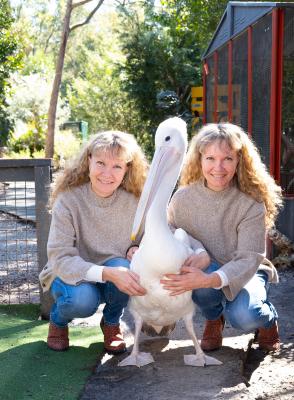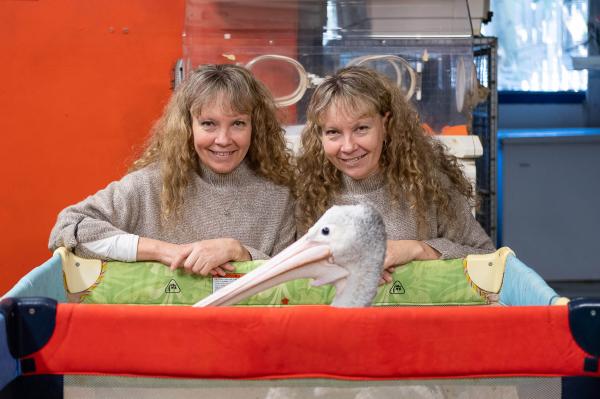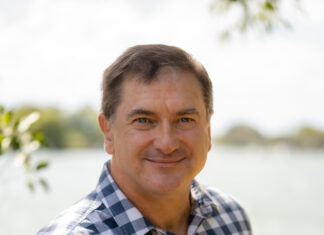It’s full house at Twinnies Pelican and Sea Bird Rescue with rescued and rehabilitating birds in every available enclosure, but sadly, due to Covid-19, not filled with the visitors who bring with them much-needed donations.
Bridgette and Paula Powers are quick to respond to a call to help pelicans and seabirds in distress from Noosa and Gympie to Brisbane and no matter how challenging the rescue of a sick or injured bird they “never give up“.
The “Twinnies“ are widely known for their dedication to their feathered friends and uncanny ability to act as one. At their Landsborough base they provide expert care and much love to numerous pelicans and seabirds as well as the many land birds that are brought to them.
But Covid-19 restrictions have greatly impacted their ability to care for their much-loved flock and they need some help.
“We haven’t been getting visitors coming in. We had bus groups but that all stopped,“ the Twinnies said.
“We’ve had no volunteers.“
Since March it’s only been the twins, their mother Helen and friend, Ken, to manage a full house of birds of all shapes and sizes.
“We’ve got through,“ the ever-positive Twinnies say in unison but they’re pleased visitors and volunteers are beginning to trickle back.
Seabirds are expensive to look after. Their fish bill alone is about $900 a week and they like to rest on clean sand. With the addition of land birds, costs include grain and medical supplies.
The birds arrive at the rescue centre for various reasons but fishing line entanglements and botulism are among the most common causes at present. The Twinnies work with RSPCA to care for them.
After warning of the fish odour which is an unavoidable part of life when dealing with sea birds the Twinnies pass the enclosures with a watchful glance over their patients, relating the birds’ individual histories and progress.
There’s Monty the juvenile Jabiru found in a poor condition by the side of the road. Pancho the Maccau came from a circus where he was mistreated but since arrival has not plucked out any of his feathers, proving to the Twinnies he is happy in his new home.
There’s a domestic duck never claimed by its owners that they couldn’t now bare to part with and an albino crow destined for a zoo. A pelican hit by a boat has become a permanent visitor. There’s a young cormorant that came in very malnourished and a Nankeen night heron they say bird watchers are very excited to see. There are a number of kookaburras and lorikeets, a black swan and various wild geese.
A couple of Channel-billed Cookoos which were too young to join the migration back to PNG will remain until they can rejoin the next annual migration. “Last year we had 18 Cookoos,“ the Twinnies said.
Outside they have constructed an aviary for birds, particularly young pelicans to improve their flying ability in safety before being released.
But by far the Twinnies pride and joy is Rob, the three-month-old pelican they raised from an egg they found lying in the nearby wetlands where pelicans breed.
“We found this egg. It was stone cold,“ the Twinnies said. “We took it and put it in the incubator. Six days later we heard it chirp. It hatched the following day.
“We’d never raised a baby pelican before. We had watched the pelicans by the dam. We’ve learnt so much from nature.“
The Twinnies provided the baby pelican a diet of mushed up fish served warm as they mothers would deliver it and Rob has grown into a magnificent, healthy specimen.
The bond between them is evident as Rob waddles between the enclosures following the Tweenies, chattering to them in his guttural, grunting way.
Should he not be able to be released into the wild the Twinnies hope to obtain a special educational permit for Rob to join them when they visit schools to talk to children about seabirds.
To assist the Twinnies through donations of cash or produce or through volunteering visit www.twinnies.com.au
The Twinnies receive calls from across the world asking for advice on various seabirds.
Their mother Helen said the Twinnies success rate at the centre was about 98 per cent. She would like to raise enough money to provide them with a good hospital and wants them to put together the knowledge they have accumulated in a book.
The Twinnies have always loved animals from their earliest recollections at the age of three.
It was a chance encounter with Steve Irwin when they moved to the Sunshine Coast about 20 years ago when they helped rescue a floating turtle that led them to work at Australia Zoo before branching out on their own.
Watching a woman rescue a pelican one day was a lightbulb moment when they realised “that was it“ they would care for pelicans and seabirds.









